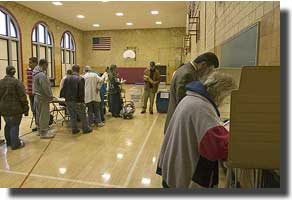国務省出版物
米国の統治の仕組み – 米国の政治制度と他の民主主義政府の類似点と相違点

2004年の大統領選挙のさい、ミシガン州ディアボーンの学校で投票するアラブ系米国人
立憲連邦共和国である米国が、独特かと言えば、そういうわけではない。むしろ、多くの「民主国家」は立憲共和国であり、米国と同様に、民主的代表制、法の支配、憲法による保護の長い歴史を持っている。
米国と他の主要な民主国家の間に見られるひとつの大きな相違点は、行政府の長の選出方法と役割である。議院内閣制では、行政府の長は議会が選出した首相であり、通例は、多数党または多数連合のリーダーが務める。そして、首相が内閣を任命し、多くの場合、内閣は議員で構成される。首相とは別に、国家元首として君主や公選大統領(または同等の公職)が置かれる場合もある。
米国では、大統領は行政府の長であると同時に国家元首である。大統領は議会とは別に選出され、議会の多数党に属する場合もあれば、そうでない場合もある。大統領の内閣を構成する者は、憲法上、同時に議員を務めることが禁じられている。
米国は、何よりもまず2 大政党制であり、10 以上の政党が議会に代表を送ることもある多くの議院内閣制とは対照的である。この結果、米国では政治路線が明確で、議院内閣制のように、しばしば連立を組んで多数与党を作る必要がない。米国の2 大政党制に寄与しているひとつの要素は、下院議員の選出に採用されている小選挙区制である。一部の議院内閣制は比例代表制を採用しているため、多くの政党に議席が配分されることになる。
もうひとつの重要な相違点は、米国では、選出された議員が改選まで務める期間が定められている点である。多くの議院内閣制では、選挙は与党が突然召集したり、政府に対する不信任投票があった場合に行われたりする。一部の議院内閣制では、国家元首が議会を解散し、新たな選挙を命じることができる。

テキサス州―民事裁判で陪審員に話しかける弁護士。多くの法廷で目にする光景である。刑事訴訟と異なり、民事訴訟は不法行為に対する損害賠償を中心に行われ、金銭賠償が命じられることが多い。
司法制度における相違点は、立法制度における相違点ほど顕著ではない。なぜなら、米国の法体制は、主として英国のコモンローに基づいているからである。刑事訴訟の被告人は、陪審による公開裁判を受ける権利と弁護人を依頼する権利を持つ。しかし、司法制度にも大きな相違点がひとつある。それは、連邦最高裁判所が法律を違憲と判断し、無効にする権限を持つことである。こうした権限が付与されている例は、他国の司法制度ではほとんど見られない。
最後に、米国政府の歳出入は、国内総生産(GDP)比で見た場合、他の大半の先進国と比較してはるかに少ない。この違いは、主に社会福祉と社会給付(医療保険や老齢年金など)に由来する。他の一部の諸国では、政府がこの費用を負担しているのに対し、米国では、こうしたサービスの多くは民間が提供しているか、あるいは政府の負担分が少ない。したがって、政府歳出に算入されていないのである。
*上記の日本語文書は参考のための仮翻訳で、正文は英文です。
Similarities, Differences Between the U.S. and Other Major Democracies
(The following article is taken from the U.S. Department of State publication, How the United States is Governed.)
Similarities and Differences Between the U.S. System of Government and Other Forms of Democratic Government
As a constitutional federal republic, the United States is not unique. Many "democracies" are in fact constitutional republics, and share with the United States long traditions of democratic representation, the rule of law, and constitutional protections.
One significant difference between the United States and some other major democracies is the selection and role of the head of government. In parliamentary systems, the head of government is a prime minister selected from the parliament, and is typically the leader of the majority political party or coalition. The prime minister appoints a cabinet of ministers often consisting of other members of parliament. A separate head of state may be a monarch or an elected President (or comparable official).
In the United States, the President is both head of government and head of state. The President is elected separately from the legislature and may or may not be of the legislature's majority political party. The President's cabinet consists of individuals who are Constitutionally prohibited from being members of Congress at the same time.
The United States is primarily a two-party system, in stark contrast to many parliamentary systems where there may be ten or more parties represented in the legislature. This results in clearly defined political lines in the United States, without the formal need for coalition-building often required to create a ruling majority in a parliamentary system. One factor contributing to the two-party system in the United States is the single-member district system of electing Representatives. In some parliamentary systems, proportional representation is used, which allows many parties to be represented in parliament.
One other significant difference is that elected officials in the United States serve for a defined period of time before facing reelection. In many parliamentary systems, elections may be called suddenly by the ruling party or if there is a vote of no confidence in the government. In some parliamentary systems, parliament may be dissolved by the head of state and new elections ordered.
Differences in the judicial system are not as significant as in the legislative, because the United States legal system is based predominantly on English common law. Defendants in criminal cases have the right to a public trial by jury and the right to be represented by counsel. One major difference in the judiciary, however, is the power of the U.S. Supreme Court to declare laws unconstitutional, thereby nullifying them. Few other countries vest such authority in their judiciaries.
Finally, the revenues and expenditures of the U.S. government are much smaller than most of its counterparts in other industrialized nations when measured as a percentage of gross domestic product. Much of the difference is due to the social services and benefits (such as health care and old-age pensions) that governments in some other nations pay for. In the United States, many of these services are delivered by the private sector or are not funded to the same extent by the government, and thus are not counted in government expenditures.




